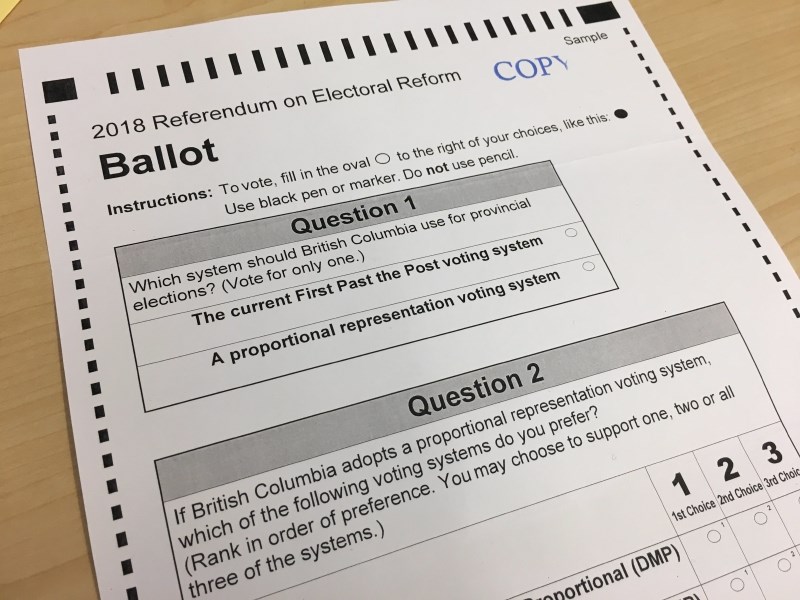 Even as people start marking their ballots in the proportional-representation referendum, MLAs are still debating a late addition to the equation.
Even as people start marking their ballots in the proportional-representation referendum, MLAs are still debating a late addition to the equation.
One of the proposed ground rules for the vote on whether to change the voting system is that if people decide in favour, another referendum will be held after two elections under the new system to decide if voters want to retain it.
Elections B.C.’s independent-answers page advises people to that effect, saying it’s what the government “intends.”
But the matter is still before the house. It’s in a one-page add-on bill tabled Oct. 2 as a companion piece to the main referendum legislation passed a year ago.
It was debated extensively last week, and will still take a few more days before it becomes law.
Maybe it’s just a technicality, but it’s a bit presumptuous for a minority government with a two-seat edge to proceed with the referendum even while important afterthoughts are still being debated.
B.C. Liberal critics find it more than just a technicality. They say it’s a blatant example of the government violating the spirit of fairness in which the referendum campaign was supposed to be conducted.
The bill establishing a followup referendum has only one purpose, said Liberal MLA Sam Sullivan (Vancouver-False Creek). “It’s to get a yes vote, to influence voters to vote yes.”
Sullivan said it’s pitched as a comfort to people who might feel uncomfortable about supporting the change, by holding out hope they could get the old system back.
Attorney General David Eby said the bill providing for a second referendum — if the current one produces a new system — is separate from the government’s campaign in favour of changing the voting system.
In fact, the yes camp could be considered to be opposed to the bill, he said, since it would put the continued use of proportional representation at risk.
He said it just flows from consultation with voters that found fairly strong support — 60 per cent, by one online poll — in favour of what has been called the exit ramp.
It was a year ago today that Eby declared himself a “neutral arbiter” of the referendum process. He’s the only one who has used the phrase since then, because the premise is so absurd.
Elected politicians can’t possibly be considered neutral arbiters. You can’t make one of the players the referee.
Eby is even less likely than most to claim the title. He’s a more partisan attorney general than most and he has some other responsibilities (ICBC) that get him routinely mixed up in political battles.
Having the neutral arbiter introduce a bill that adds a new element to the referendum even as people are voting is another weird element to an initiative that already has a few. (Such as being able to vote for and against at the same time, for instance.)
It’s another example of a fundamental point of concern — the whole exercise was designed by two political parties jockeying for power.
It’s the one proposal that needs impartial, independent, non-partisan oversight, and almost none of that has been built in.
The opposition is not just suspicious of the NDP’s motivations for the last-minute bill that allows for a re-do; they’re also skeptical of it actually coming to pass.
Liberal MLA Tom Shypitka (Kootenay East) said the 2018 legislature can’t possibly legislate the actions of a government two election cycles down the road.
“We won’t, most likely, have majority governments. We’ll have maybe three, four, five or six parties in here, and for them to vote against something that will actually keep them in the place that they’re in is almost impossible.
“It won’t happen. Realistically, it’s just not fathomable.”
Assuming the current bill passes, a future government would have to void it in some fashion to quash the need for another referendum.
If governments elected under proportional representation run their full terms, that would be some time in 2030.
Viewed today, it’s either a worthwhile safety valve, or another effort by the NDP to nudge voters into the yes camp, depending on your outlook.
What it will look like 12 years from now is anyone’s guess.



